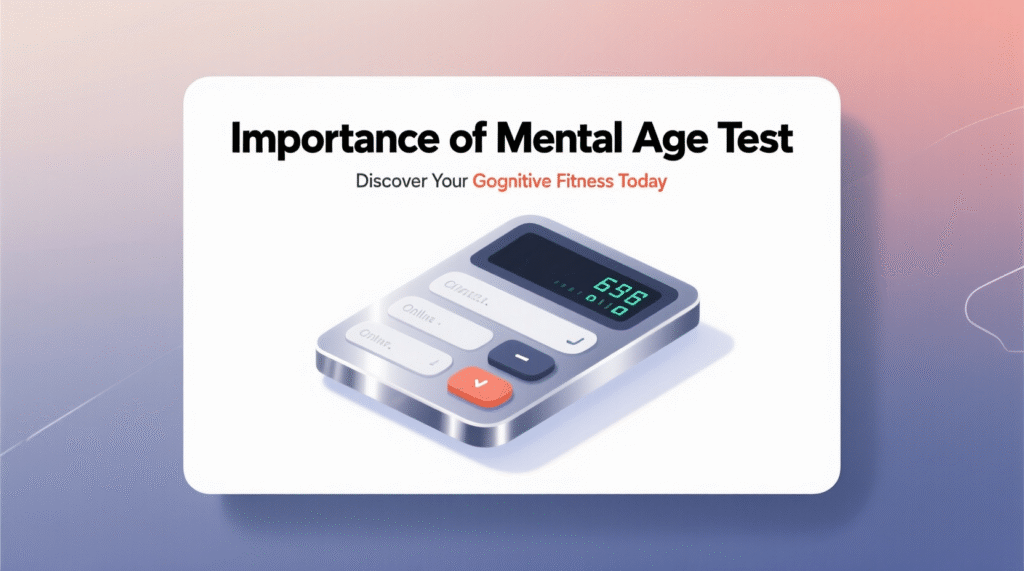
When people talk about age, they usually mean the number of years since birth—your chronological age. But that doesn’t always match how you think, feel, or behave. That’s where mental age comes in. A mental age test measures how your thought patterns, maturity, and emotional intelligence compare to your actual years.
So, why is this test important? Because it offers insights into self-awareness, relationships, and personal development that your birthday alone can’t explain.
What Is a Mental Age Test?
A mental age test is a psychological tool or self-assessment designed to evaluate how mature your mind feels compared to your real age. Unlike IQ tests or personality quizzes, mental age tests focus on:
- Decision-making style
- Emotional maturity
- Preferences and attitudes
- Behavior in social situations
For example:
- A 25-year-old who thinks like a 40-year-old may show more cautious, structured decision-making.
- A 40-year-old with a mental age of 20 might approach life with playfulness and spontaneity.
If you want to understand your thought patterns, try our psychological maturity test.
Why Is Mental Age Important?
Here are the main benefits of taking a mental age test:
1. Self-Awareness
Knowing your mental age helps you understand yourself beyond just a number. It highlights your mindset, how you perceive the world, and how aligned you are with your chronological age.
2. Emotional Intelligence
Your mental age often reflects how well you manage emotions and respond to challenges. Recognizing this can guide you toward building stronger emotional regulation.
3. Relationship Harmony
Mismatched mental ages in friendships or romantic relationships can lead to conflicts. Understanding your mental age helps you find better compatibility and adjust expectations.
4. Career and Life Choices
A higher mental age may align with leadership roles, while a younger mental age can be beneficial in creative, dynamic fields. This awareness can shape career growth and satisfaction.
5. Personal Growth
By knowing your mental age, you can set intentional goals—whether it’s becoming more mature in decision-making or embracing more spontaneity.
Find out how your mental age compares to your actual years in mental age vs real age.
Real-Life Scenarios
- Workplace: Someone with a higher mental age may handle stress better and be seen as a dependable leader.
- Relationships: If your partner has a significantly different mental age, you may approach communication or priorities differently.
- Lifestyle: A lower mental age can mean staying curious, adventurous, and open to change.
Comparison: Mental Age vs Chronological Age vs Emotional Age
| Type of Age | What It Reflects | Why It Matters |
|---|---|---|
| Chronological Age | Years since birth | Medical, legal, and official purposes |
| Mental Age | How your mind processes decisions and maturity | Guides self-awareness and decision-making |
| Emotional Age | How you manage and express emotions | Impacts relationships and stress management |
How to Use Your Mental Age Test Results
- Reflect – Compare your results with how you act in daily life.
- Set Goals – Work on areas where you want balance (e.g., patience, creativity).
- Track Growth – Retake the test occasionally to see progress.
- Apply Insights – Use your results to improve relationships, work performance, and self-care.
FAQs
Why is a mental age test important?
It gives you insights into your maturity, emotional intelligence, and decision-making beyond chronological age.
Can mental age change over time?
Yes, as you gain life experience, your mental age can shift higher or lower depending on circumstances.
Is a higher mental age always better?
Not necessarily. A higher mental age may indicate maturity, while a lower one can reflect creativity and flexibility.
What does it mean if my mental age is younger than my real age?
It could mean you approach life with curiosity and playfulness, which can be a strength.
Is mental age the same as IQ?
No. IQ measures cognitive ability, while mental age reflects maturity and mindset.
- You will discover the specific benefits of taking this assessment for your long-term personal development.
- Knowing exactly what affects your mindset allows you to make better life choices.
- Many people simply want to know if it is the same as IQ before investing time in the process.
- It helps to see the contrast between mental age and emotional age when setting future goals.
- If you are curious about your status, you can calculate it online to get an instant baseline.
- Biological factors often determine when women mature mentally compared to their male counterparts.
- For a broader overview, you can check our comprehensive guide on psychological testing.